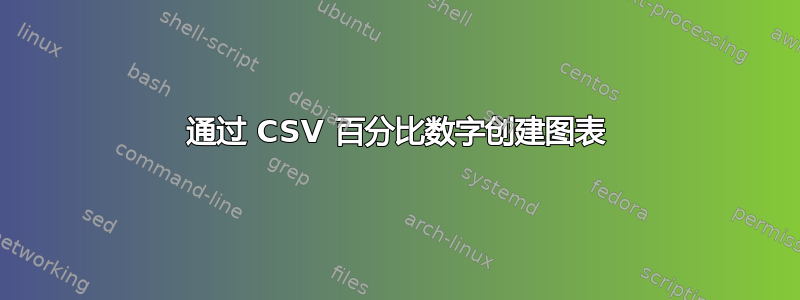
我正在尝试用 LaTeX 绘制此图:
这是我的尝试:
\documentclass[12pt,a4paper]{article}
\usepackage[margin=2.5cm]{geometry}
\usepackage{tikz,pgfplots,pgfplotstable}
\pgfplotsset{compat=1.17}
\usepackage{csvsimple}
\pgfplotstableread[col sep=comma]{res/operating-profit-margin-data.csv}{\operatingprofitmargindata}
\begin{document}
\begin{tikzpicture}
\begin{axis}
\addplot table[x index = {1}, y index = {1}]{\operatingprofitmargindata};
\end{axis}
\end{tikzpicture}
\end{document}
csv文件中的数据如下:
,2018,2019,2020,2021,2022
Industry benchmark,28.83,14.11,20.57,25.25,20.55
Bioventix PLC,78.08,74.61,79.35,73.99,79.13
NIOX Group PLC,-83.64,-2.16,-72.38,-15.41,5.75
Oxford Biomedica PLC,20.84,-22.58,-6.49,14.54,-21.59
不确定如何使我的图表看起来符合预期。
答案1
数据转置后事情就变得简单了:
\documentclass[border=10pt]{standalone}
\begin{filecontents}{operating-profit-margin-data.csv}
Year,2018,2019,2020,2021,2022
Industry benchmark,28.83,14.11,20.57,25.25,20.55
Bioventix PLC,78.08,74.61,79.35,73.99,79.13
NIOX Group PLC,-83.64,-2.16,-72.38,-15.41,5.75
Oxford Biomedica PLC,20.84,-22.58,-6.49,14.54,-21.59
\end{filecontents}
\usepackage{pgfplotstable}
\pgfplotsset{compat=1.18}
\pgfplotstableread[col sep=comma]{operating-profit-margin-data.csv}
{\operatingprofitmargindata}
\pgfplotstabletranspose[string type,
colnames from=Year,
input colnames to=Year
]\operatingprofitmargindatatransposed{\operatingprofitmargindata}
\begin{document}
\begin{tikzpicture}
\begin{axis}[
xticklabel style={
/pgf/number format/1000 sep={}
},
yticklabel style={
/pgf/number format/fixed zerofill,
/pgf/number format/precision={2}
},
yticklabel={\pgfmathprintnumber{\tick}\,$\%$},
ymin=-100,
ymax=100
]
\addplot table[y={Industry benchmark}] {\operatingprofitmargindatatransposed};
\addplot table[y={Bioventix PLC}] {\operatingprofitmargindatatransposed};
\addplot table[y={NIOX Group PLC}] {\operatingprofitmargindatatransposed};
\addplot table[y={Oxford Biomedica PLC}] {\operatingprofitmargindatatransposed};
\end{axis}
\end{tikzpicture}
\end{document}
答案2
尝试这个:
\documentclass{standalone}
\usepackage{pgfplots}
\pgfplotsset{compat=newest}
\begin{document}
\begin{tikzpicture}
\begin{axis}[
title={Operating Profit Margin},
xlabel={},
ylabel={},
xmin=2017.5, xmax=2022.5,
ymin=-100, ymax=100,
xtick={2018,2019,2020,2021,2022},
xticklabel style={/pgf/number format/1000 sep=},
ytick={-100,-80,...,100},
yticklabel={$\pgfmathprintnumber{\tick}\%$},
ymajorgrids=true,
grid style={solid},
axis line style={draw=none},
tick style={draw=none}, % This will remove the tick marks
legend style={at={(0.5,-0.15)},anchor=north,legend columns=2,draw=none}
]
\addplot[
color=green,
mark=*,
]
coordinates {
(2018,28.83)(2019,14.11)(2020,20.57)(2021,25.25)(2022,20.55)
};
\addlegendentry{Industry benchmark}
\addplot[
color=orange,
mark=*,
]
coordinates {
(2018,78.08)(2019,74.61)(2020,79.35)(2021,73.99)(2022,79.13)
};
\addlegendentry{Bioventix PLC}
\addplot[
color=blue,
mark=*,
]
coordinates {
(2018,-83.64)(2019,-2.16)(2020,-72.38)(2021,-15.41)(2022,5.75)
};
\addlegendentry{NIOX Group PLC}
\addplot[
color=purple,
mark=*,
]
coordinates {
(2018,20.84)(2019,-22.58)(2020,-6.49)(2021,14.54)(2022,-21.59)
};
\addlegendentry{Oxford Biomedica PLC}
\end{axis}
\end{tikzpicture}
\end{document}





